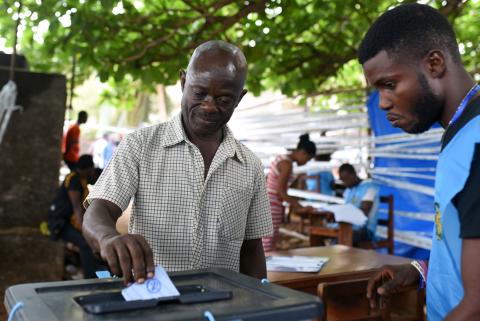Advertisement
Sierra Leone heads to the polls to seek successor to Koroma
FREETOWN (Reuters) - Sierra Leone voted on Saturday in a poll delayed by fraud allegations to choose a successor to President Ernest Bai Koroma who leaves a country still struggling after the Ebola epidemic.
The face-off between opposition leader Julius Maada Bio and ruling party standard-bearer Samura Kamara was supposed to take place on Tuesday but was rescheduled after a complaint about fraud in the first round of voting this month from a member of Kamara's All People's Congress.
The successor to Koroma, who is stepping aside after his maximum two five-year terms in office, faces an uphill struggle to overturn years of hardship caused by a slump in the price of its commodity exports and Ebola.
Voting got under way early in peaceful conditions, according to witnesses, though some complained that a heavy police presence inside polling stations was deterring people from casting their ballot.
Staff at two polling stations said turnout in the morning was lower than in the first round. Many were forced to walk to their nearest voting station because of a driving ban imposed on election day for security reasons.
"There is low turnout in different parts of the country because of the huge presence of security forces," Julius Maada Bio said after voting in Freetown.
President Koroma also noted the low turnout when he spoke in Freetown, and urged people to head to their polling stations.
Concern about policing comes after the National Electoral Commission last week said that police had tried to intimidate staff in the run-up to the election.
Speaking to the media, army spokesman Major Paow Kagbo said the military personnel were there to ensure the election was "free and fair".
Politics in the West African country of over seven million people has been dominated by two parties since independence from Britain in 1961: the ruling All People's Congress, now fielding ex-foreign minister Samura Kamara, and the Sierra Leone People's Party behind Julius Maada Bio, who briefly ruled as head of a military junta in 1996.
The first round of voting was marred by allegations of fraud in some districts. In some districts, police fired tear gas to disperse crowds after a dispute over voting irregularities.
But the generally peaceful nature of the election, and the fact Koroma is stepping down while some other African presidents seek to extend their mandates, is seen as a positive sign for Sierra Leone that was ripped apart by a 1990s civil war.
The Ebola crisis in 2014 and 2015 and the global commodities downturn slowed the economy, which shrank by a fifth in 2015.
(Additional reporting by Christo Johnson; Writing by Edward McAllister; Editing by Stephen Powell)



















Add new comment